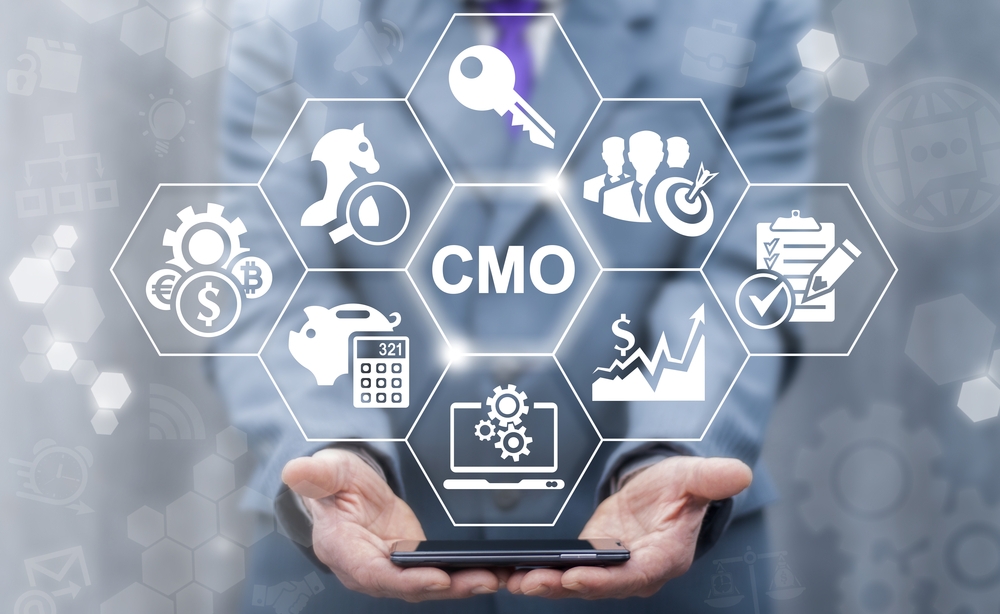Today’s B2B CMO is tasked with being the driver for customer experience and revenue. In order to accomplish this goal, CMOs must care about their impact on the sales process, tell great stories to enhance customer engagement and remain tech savvy to streamline and maximize their team’s efforts.
With these objectives in mind, CMOs are faced with a unique set of challenges. As technology continues to infiltrate every part of the customer journey, there is a shift in consumers seeking a more personalized and human experience.
Alongside intangibles such as experience and engagement, modern CMOs are feeling the pressure to be accountable for reporting. Measuring likes and email click-through rates, however, is not enough. As the true test of any marketing professional boils down to two things: sales and revenue.
For a deeper perspective on what is required in today’s fast-paced marketing world, Demand Gen Report reached out to five industry thought leaders to get their input on what traits the modern CMO needs to be successful.
Ashley Stepien, Marketing Chief of Staff, Appirio
 As landscapes get more competitive, it’s not enough for CMOs to oversee the marketing stack. The modern CMO should not only constantly evaluate how their initiatives impact the bottom line, but also how they affect the sales process. This may mean gathering data at a more granular level than required for quarterly reporting. Showing that a specific campaign affected sales booking rates or website conversions is infinitely more valuable data than “likes” on a particular Facebook post.
As landscapes get more competitive, it’s not enough for CMOs to oversee the marketing stack. The modern CMO should not only constantly evaluate how their initiatives impact the bottom line, but also how they affect the sales process. This may mean gathering data at a more granular level than required for quarterly reporting. Showing that a specific campaign affected sales booking rates or website conversions is infinitely more valuable data than “likes” on a particular Facebook post.
Meeting with the sales team regularly is also helpful to gather information on your target audiences. The more industries your company targets, the more knowledge you’ll need to glean on who exactly you’re marketing to. Every industry is accompanied by a unique set of pain points. No one will know these better than your sales team, as well as the questions and objections they hear every day.
Finally, marketing traditionally has left all interaction with potential customers to the sales team, acting as an agency independent of the sales funnel. Thus, CMOs tend to be very removed from conversations with potential customers. In crafting marketing messages that will resonate with prospects, connecting with these people to pitch an idea and gather feedback is imperative. Gut reactions are ineffective when you’re gauging how well a message will perform, and the only way to get to know your audience is to interact with them.
Michael Brenner, CEO, Marketing Insider Group
 The newest traits that the modern CMO needs to have include an understanding of how to sell the value of empathy to executives who may not have any. That takes a combination of business acumen and being able to tell (or sell) the story of how customer engagement occurs when we believe the brands we chose actually care about us.
The newest traits that the modern CMO needs to have include an understanding of how to sell the value of empathy to executives who may not have any. That takes a combination of business acumen and being able to tell (or sell) the story of how customer engagement occurs when we believe the brands we chose actually care about us.
The only way to make customers feel like you care is with a highly engaged workforce. CMOs should make every effort to build a culture focused on customer experience playing a key role in the employee engagement initiatives inside the company. This goes beyond just internal communication and extends to employee activation.
CMOs Need to Move From — To:
- Building Brand – Transforming culture
- Driving Demand – Delivering sought-after customer experiences
- Internal communications – Employee activation
Rebecca Lieb, Industry Analyst & Advisor, RebeccaLieb.com
 One of the things modern CMOs must keep up with is technology and technology developments. The latest title being flung around marketing circles is Chief Marketing Technology Officer. While I don’t believe it will become a common title in the C-suite, it is very indicative of the fact that digital marketing — which is dominating marketing and has superseded traditional channels — is 100% based on technology. And not just on point technologies, but on technology integrations.
One of the things modern CMOs must keep up with is technology and technology developments. The latest title being flung around marketing circles is Chief Marketing Technology Officer. While I don’t believe it will become a common title in the C-suite, it is very indicative of the fact that digital marketing — which is dominating marketing and has superseded traditional channels — is 100% based on technology. And not just on point technologies, but on technology integrations.
No software or solution is an island. Everything has to play nice with everything else. Keeping ahead of a dizzying technological landscape is one of the things that modern CMOs need to concern themselves with, first and foremost.
The second thing is the eclipse of advertising. Paid media is not going away, but it is absolutely plummeting in terms of efficacy. It’s always easier to buy something — time or space in this case — than it is to think more creatively about how to market oneself on social media channels, on earned media channels or even through customer experience and the product itself.
But what we’re seeing with some of the most innovative marketers, like Amazon and Tesla, is that the product itself is marketing. The CMOs purview is expanding beyond marketing and advertising into customer experience.
Jon Russo, Founder, B2BFusion
 As a former high tech CMO for 10 years myself, and through our client work over the past six years, I’ve seen a lot of different iterations of what it means to be a CMO. The one thing that has remained constant is the challenge of reporting. CMOs today have to be very versatile in understanding different digital capabilities, but all of these capabilities have their own reporting mechanism making it challenging to get a single view of the reporting truth when systems don’t integrate.
As a former high tech CMO for 10 years myself, and through our client work over the past six years, I’ve seen a lot of different iterations of what it means to be a CMO. The one thing that has remained constant is the challenge of reporting. CMOs today have to be very versatile in understanding different digital capabilities, but all of these capabilities have their own reporting mechanism making it challenging to get a single view of the reporting truth when systems don’t integrate.
Ultimately, reporting impacts CMO credibility, which in turn drives the ability to get more resources. Today’s CMOs are under such pressure to be accountable and with the growing set of digital tools, the challenge of reporting is getting harder, not easier.
As a result, they have to be digitally savvy to understand the array of systems they’re using and to be able to communicate the expectations of what a system can deliver to non-marketers. Some level of CMO, hands-on system experience can go a long way here.
In addition to being digitally savvy, they must also possess some level of business and financial savviness. A CMO should know how to read a balance sheet and be able to use financial lingo when they’re reporting their impact on the business. They’ve got to get out of our proprietary marketing ‘Star Trek language’ which is unfamiliar to CFOs and get into the language the CFOs speak – one of the financials.
Lastly, it’s important for CMO’s to foster a test & learn environment in their organization. Technology allows for fast implementation and fast results, so organizations should be trying new things on acquisition, expansion and retention in some of their key accounts, and learning from it as quickly as possible.
Some CMOs have a very limited appetite for risk, but one has to try something new to move the ball forward. This is where having experienced partners who have cross-functional industry experiences can help minimize the risk for CMOs in experimenting digitally.
Jeff Marcoux, Vice President of Product Marketing & Customer Experience Solutions, Teletech
 I’m seeing four things that CMOs really need to champion in order to be successful in today’s modern, digitally-driven world.
I’m seeing four things that CMOs really need to champion in order to be successful in today’s modern, digitally-driven world.
Number one: they have to be focused on being a revenue driver in the company. No longer can they just focus on likes and email campaigns and clickthrough rates, but they have to be looking at metrics that directly impact revenue — cost of customer acquisition (CAC), customer lifetime value (CLV), churn rate, payback periods and ratios to help understand the impact to the business.
Marketing has to make the pivot from a cost center to a revenue driver. We’re seeing this happen with account-based engagement and marketing. The organizations focusing on that — and doing it right — are the ones that are going to win. We have been saying this for years but it still is not happening. CMOs need to bring together marketing and sales by being involved in account planning calls and using predictive analytics to support their sales teams.
The second thing is being the customer experience driver. The tech explosion has caused us to lose touch with our customers and we’ve lost the human side of the business. We’re seeing a shift now where customer experience is becoming more important than features or price.
The CMO is the only person in the company who has the data to see across the entirety of the business from first touch point through the sales cycle, to onboarding and customer service to churn. Marketing has to bring the data lens across the whole customer journey to find the best customer experience possible.
The third thing they have to be is a technologist. With over 5000 MarTech, AdTech and SalesTech tools out there, CMOs have to be able to put together the right combination of tools to drive their business. Once they have it, they also need to ensure they’re maximizing on the investments they’ve made and get the value out of the systems they’re using. I am constantly blown away by how many businesses own Marketo or Eloqua and are using them like you would a simple tool like MailChimp. Most marketing departments are using less than 50% of their MarTech tool capabilities and that is just wasting money.
Lastly, the modern CMO must be an innovator. In today’s world, we’re rife with disruption with all of these new technologies and startups popping up. CMOs need to be asking “Who’s coming into my space? What disruptors are coming into my industry? And how do we disrupt ourselves to prevent us from being disrupted?” The CMO should be driving the strategy and experimenting to innovate within the company.
What are your thoughts on the new traits of the modern B2B CMO? Share them in the comments below.







